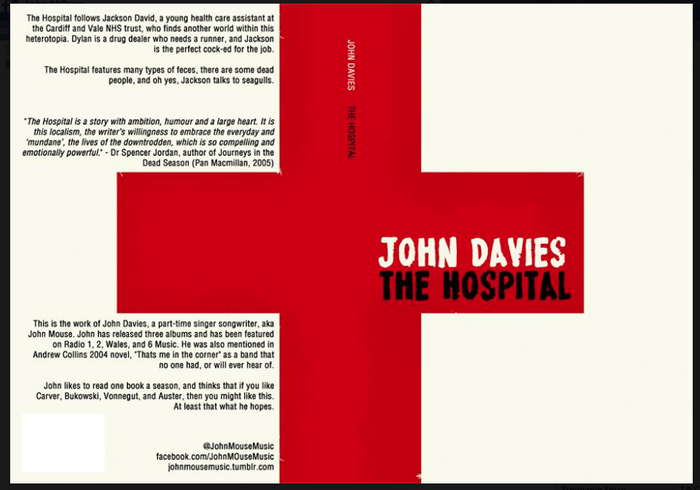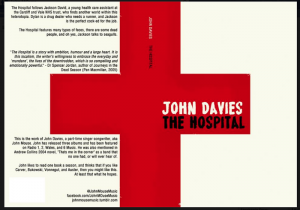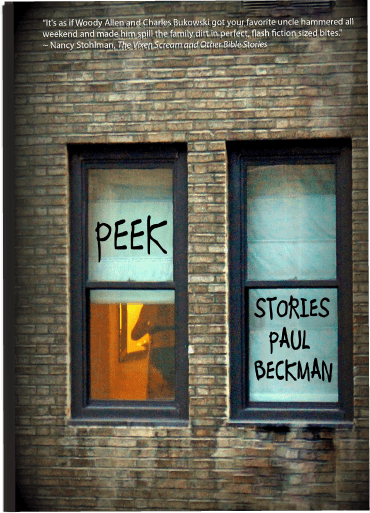The Hospital by John Davies
-Reviewed by Eleanor Hemsley-
The Hospital is a story filled with gritty reality about the health system in the early 21st century. We follow a health care worker through a short period in his life where he wants to escape, and journey with him as he tries to get out of a job he’s not completely satisfied with.
The opening to this story is so strong and real, sitting you right in the middle of the hospital with characters that you aren’t sure you want to be with. The descriptions such as ‘bald head, some scabs above left eyebrow, gummy mouth…’ really give you a sense of how ordinary being next to a corpse is to a health care worker and their casual attitudes make you hate them at the same time as feel sorry for them.
Dylan (one of the health care workers) is definitely the most dislikeable character in the story yet at the same time he’s also the strongest, the one we’re left remembering once the last page is turned. Although he’s not the narrator of the story we feel closest to him, especially at the start, it feels as if he is the main focus of the tale, and that despite his horrible nature we should forgive him and feel with him.
However, the rest of the book leaves much to be desired. Throughout the whole piece we get the feeling that the author doesn’t know what he wants to write or even his own market, switching from a distant first person narrative, to a badly formatted script layout, to a close, almost stream-of-consciousness, narrative. Not only this, but the genre is unclear and hazy throughout, switching from action-packed scenes to sex scenes to inner-thought scenes.
My main problem was not knowing who the Hell was narrating the piece! How are we meant to connect with the story and the protagonist if we don’t even know who they are? I found that for at least the first ten pages there was no narrator, and then when it occurred to me this was from one man’s point of view it took me a very long time to figure out whose. The entire narrative is a confused blur, so much that it feels at times like the narrator isn’t even attached to the story in any way.
Backstory of course is important and here it is completely necessary for the story to make sense, but the way Davies has put it in is less woven in and more dumped – a huge section in the middle, that by the time you’ve finished you’ve forgotten what’s happening now in the hospital (I suggest reading pages 34-40 before you start to avoid this problem).
It’s a book set in a hospital. If you hadn’t figured that out by the title it’s made pretty clear in the first paragraph. But it’s also a book that feels as if it uses wrong hospital terminology. I could be wrong, but a freshly dead patient who has died a minute before is not a ‘stiff’, and in fact wouldn’t be physically stiff for a fair few hours. It saddens me that this piece feels so under-researched, and although a lot of readers won’t notice and will be happy enough to read this, I found that it really jarred my reading of the story and made me believe the characters and narrator even less.
The worst thing though, the thing that made me digitally throw the book at a virtual wall, was the author’s laziness. Towards the end of the story there are two ‘mental health nurse auxiliaries’ that the narrator works with for a short while, and instead of doing the normal and realistic thing and giving them names, Davies decides to write them as ‘MHNA1’ and ‘MHNA2’. Come on Mr Davies, if you can’t be bothered to write it out or even name the people he’s working with, I can’t be bothered to read it. There’s also a number of typos and basic mistakes that should not be there, for example using ‘bare’ instead of ‘bear’. These mistakes would easily be corrected with the use of an editor, but unfortunately one seems not to have been used here and so we find ourselves annoyed at the writer for basic grammatical errors. A word of advice for you writers out there: invest in an editor. Please.
The ending of The Hospital though redeems the mistakes, but only a little. We find our hearts running free with the narrator’s only to be caged once more within the hospital we’ve just escaped from. We feel trapped and scared to be taken care of by Dylan. Perhaps the story is meant to reflect the circular way of life, how we always end up where we began no matter how much we fight against it. So okay, the ending was very satisfying and I finally found myself caring for the narrator, but it’s a book I will probably never read again.






